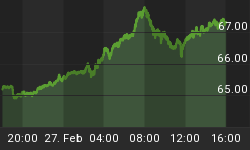On Tuesday it became apparent to a lot of investors just how far stocks have rallied since 2008, when the Dow crossed the 13,000 point mark in decisive fashion. From here, that index only needs to rally another 7% in order to retake all-time highs.
At the same time, the NASDAQ Composite has crossed the 3,000 point mark, reaching its highest levels since November of 2000 - which readers may recall was in the middle of the dotcom bubble.
Several factors have been propelling stocks higher, perhaps most notably the positive economic data that frequent readers will know we've seen developing over the past several months. Last week we saw retail sales rise, which many may attribute entirely to higher gas prices.
While prices at the pump have certainly caused Americans to refine their spending habits, spending has been up in other areas as well, including among restaurants. In fact, demand has picked up to the point that many retail businesses are stocking up on inventory - now that they realize renewed demand is likely sustainable.
At the same time, US banks have been passing stress tests, mostly with flying colors. The majority have actually been approved to pay larger dividends to shareholders, as well as increasing share buybacks. It should be clear by now that the financial crisis of 2008 is officially over.
Still, there remains a substantial amount of pessimism in the markets, especially considering these circumstances. It shouldn't be hard to see that the cynicism is unwarranted; in fact it seems difficult to believe that the cynics have any credibility remaining anyway. After all, the same people (1) missed the market's top in 2008, (2) rode the market all the way down, insisting things weren't that bad, (3) started screaming 'sell' almost precisely at the market's bottom, and most recently (4) missed almost the entire rally in stocks since they bottomed in early 2009.
Even the Federal Reserve has lately been forced to admit things are looking up for the US economy. It seems that finally they're coming around to what we've been saying for months now.
Unfortunately, this only goes to reinforce another point we've been preaching - that inflation will ultimately become a problem.
As we've written about previously, between multiple rounds of quantitative easing and prolonged cheap-money policies, a ton of new money has been created by the Fed and Treasury over the past several years in response to the 2008 financial crisis and subsequent recession. To date, inflation has remained rather insignificant simply because the velocity of money has been so low - so all this new money hasn't been turning over in the economy.
As the economy continues to pick up, a projection that is becoming more widely accepted, all those newly-created dollars going to begin turning over. In all likelihood the velocity of money in this country will accelerate faster than the Fed can react. Chairman Bernanke is going to learn the hard way the difficulty of putting the lid back on Pandora's Box.
As a result, this country may very well see double-digit inflation within the next 4-6 years. The only foreseeable way to avoid such a calamity is if we're able to elect a president in November who is capable of recognizing the problem and spurring quick and decisive corrective action.















